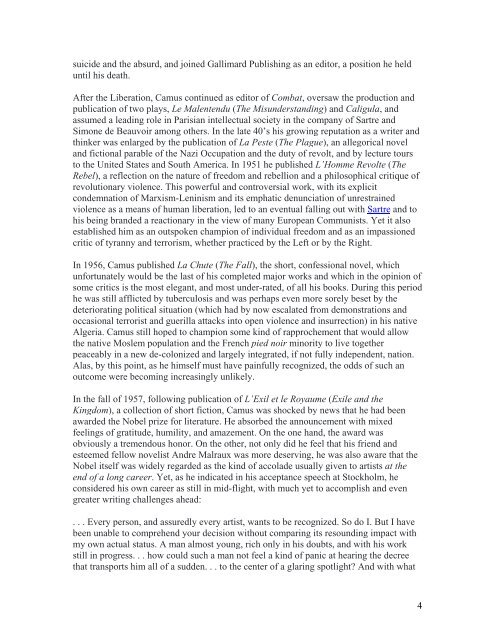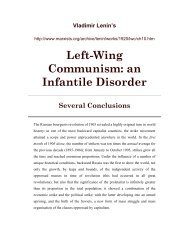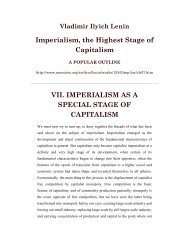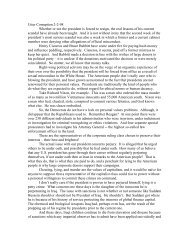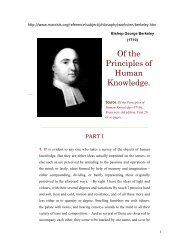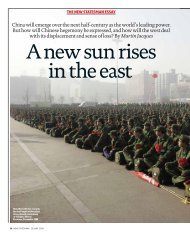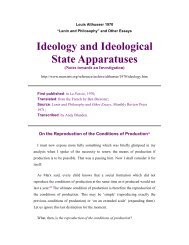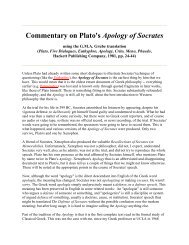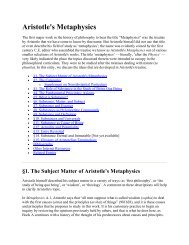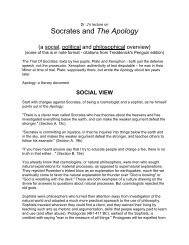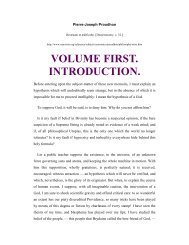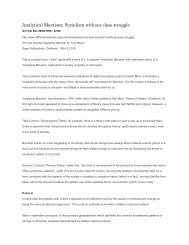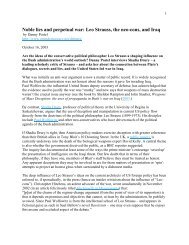Albert Camus (1913â1960) - Richard Curtis
Albert Camus (1913â1960) - Richard Curtis
Albert Camus (1913â1960) - Richard Curtis
Create successful ePaper yourself
Turn your PDF publications into a flip-book with our unique Google optimized e-Paper software.
suicide and the absurd, and joined Gallimard Publishing as an editor, a position he held<br />
until his death.<br />
After the Liberation, <strong>Camus</strong> continued as editor of Combat, oversaw the production and<br />
publication of two plays, Le Malentendu (The Misunderstanding) and Caligula, and<br />
assumed a leading role in Parisian intellectual society in the company of Sartre and<br />
Simone de Beauvoir among others. In the late 40’s his growing reputation as a writer and<br />
thinker was enlarged by the publication of La Peste (The Plague), an allegorical novel<br />
and fictional parable of the Nazi Occupation and the duty of revolt, and by lecture tours<br />
to the United States and South America. In 1951 he published L’Homme Revolte (The<br />
Rebel), a reflection on the nature of freedom and rebellion and a philosophical critique of<br />
revolutionary violence. This powerful and controversial work, with its explicit<br />
condemnation of Marxism-Leninism and its emphatic denunciation of unrestrained<br />
violence as a means of human liberation, led to an eventual falling out with Sartre and to<br />
his being branded a reactionary in the view of many European Communists. Yet it also<br />
established him as an outspoken champion of individual freedom and as an impassioned<br />
critic of tyranny and terrorism, whether practiced by the Left or by the Right.<br />
In 1956, <strong>Camus</strong> published La Chute (The Fall), the short, confessional novel, which<br />
unfortunately would be the last of his completed major works and which in the opinion of<br />
some critics is the most elegant, and most under-rated, of all his books. During this period<br />
he was still afflicted by tuberculosis and was perhaps even more sorely beset by the<br />
deteriorating political situation (which had by now escalated from demonstrations and<br />
occasional terrorist and guerilla attacks into open violence and insurrection) in his native<br />
Algeria. <strong>Camus</strong> still hoped to champion some kind of rapprochement that would allow<br />
the native Moslem population and the French pied noir minority to live together<br />
peaceably in a new de-colonized and largely integrated, if not fully independent, nation.<br />
Alas, by this point, as he himself must have painfully recognized, the odds of such an<br />
outcome were becoming increasingly unlikely.<br />
In the fall of 1957, following publication of L’Exil et le Royaume (Exile and the<br />
Kingdom), a collection of short fiction, <strong>Camus</strong> was shocked by news that he had been<br />
awarded the Nobel prize for literature. He absorbed the announcement with mixed<br />
feelings of gratitude, humility, and amazement. On the one hand, the award was<br />
obviously a tremendous honor. On the other, not only did he feel that his friend and<br />
esteemed fellow novelist Andre Malraux was more deserving, he was also aware that the<br />
Nobel itself was widely regarded as the kind of accolade usually given to artists at the<br />
end of a long career. Yet, as he indicated in his acceptance speech at Stockholm, he<br />
considered his own career as still in mid-flight, with much yet to accomplish and even<br />
greater writing challenges ahead:<br />
. . . Every person, and assuredly every artist, wants to be recognized. So do I. But I have<br />
been unable to comprehend your decision without comparing its resounding impact with<br />
my own actual status. A man almost young, rich only in his doubts, and with his work<br />
still in progress. . . how could such a man not feel a kind of panic at hearing the decree<br />
that transports him all of a sudden. . . to the center of a glaring spotlight? And with what<br />
4


